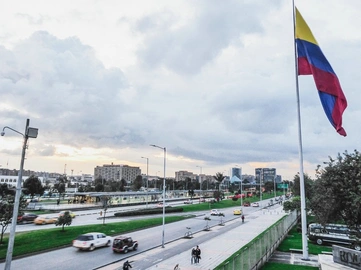Environmental peace-building and development in Colombia
April 17, 2019.
Passing the checkpoint at the gate of the National University of Colombia, we already see lively activity on campus and hear the sound of salsa music from afar. Students are on strike due to the difficult financial situation of public universities. Nevertheless, and despite reduced teaching activities, youngsters wait patiently in front of the modern, minimalist-built auditorium Natividad Pinto to register for admission.
It is October 16, 2018 and people from science, politics and civil society backgrounds have come together at the National University in Bogotá for the opening conference of the bilateral <link https: zef.de project dssp external-link-new-window internal link in current>Doctoral Studies Support Program (DSSP) between ZEF and the Institute for Environmental Studies (IDEA) of the National University.
"We appreciate the bilateral Doctoral Studies Support Program with its interdisciplinary approach to research. It supports sustainable development and peace process in Colombia and also the implementation of the UN's Sustainable Development Goals (SDGs). To understand the environmental dimension of the peace process, international and scientific cooperation such as the DSSP program are needed", says Daniel Alscher, who gives a keynote at the opening workshop on behalf of the German Embassy in Colombia.
The Doctoral Studies Support Program is funded by the German Academic Exchange Service (DAAD) and the Federal Ministry for Economic Cooperation and Development (BMZ). The project in Colombia is part of an international DAAD program promoting the SDGs by establishing bilateral graduate schools: four in Africa, two in Latin America and one in Asia (<link http: bit.ly external-link-new-window internal link in current>see DAAD's website).
Colombia is a show-case country in which struggles over territorial rights, land use and extraction of natural resources have been deeply entrenched with diverse forms of violence. Fifty years of armed conflict in the country have led to the exploitation and destruction of the environment in addition to the expropriation of land and displacement of the rural population. Against the background of the Colombian peace agreement and the professed end to armed conflicts between guerrilla groups and the government in 2016, researchers are now investigating the interrelatedness of sustainable peace, land rights and environmental issues. The researchers are looking at the options for how to allocate land without invoking conflict, and how to cultivate it in a sustainable way.
"A possible challenge that this program could face is its short project duration. Colombia is very rich and diverse in terms of culture, languages, geographical conditions and biodiversity. It will take time for the Colombian students as well as their international partners to even begin to learn about all the factors contributing to the conflicts," says Tomás Enrique León Sicard, the program coordinator of the DSSP from IDEA.
Lars Gerold, who is responsible for the bilateral SDG graduate programs at DAAD and is attending the kick-off workshop in Bogotá, acknowledges that despite the challenges "ZEF has already achieved a lot by setting up a bilateral SDG Graduate school in Bogotá and by integrating a partner network with Nicaragua, Cuba and Ghana. The new local structures which are being established are meant to facilitate a process of joint knowledge creation. Here, students and scientists from the global South and North are working together to develop solutions for global issues."
Key drivers of the cooperation process are the high motivation and dedication of the doctoral students enrolled in the program. Many of the doctoral students are already working with local projects in conflict areas. Juliana Sabogal, a doctoral student at the National University of Colombia, explains to us that she applies her academic research at the university to her work with local agricultural movements in Pastó where, she relates, "food security is low and people have suffered from the impact of displacement".
Eva Youkhana, who is project leader and program coordinator of the DSSP and acting Director at ZEF, states: "We have set up a mutual digital research database monitored by project staff in Bonn and Bogotá within a short time span. ZEF also supported IDEA with getting their doctoral program accredited. I am confident that the program will have a long-term effect because the students, once graduated, will act as multipliers at the university and throughout the region."



